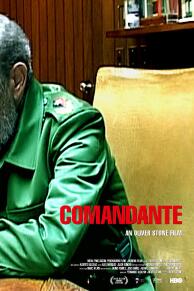Portrait of the revolutionary as an old man: on Oliver Stone's Comandante
by anna battista
 Old black and white images alternate to more modern ones in colour, stills alternate to moving images. Then the set changes: a man is talking to his entourage, smiling and joking. The camera follows him, surrounded by a group of people, to his office. These shots would perhaps be very boring if the man we are following to his office weren't Fidel Castro. Indeed we are on the set for Oliver Stone's latest film, Comandante, a sort of documentary about Fidel Castro. Shot in three days in February 2002, these 93 minutes of footage are what Stone carved out of his 30 hours of conversation with the Cuban leader.
Old black and white images alternate to more modern ones in colour, stills alternate to moving images. Then the set changes: a man is talking to his entourage, smiling and joking. The camera follows him, surrounded by a group of people, to his office. These shots would perhaps be very boring if the man we are following to his office weren't Fidel Castro. Indeed we are on the set for Oliver Stone's latest film, Comandante, a sort of documentary about Fidel Castro. Shot in three days in February 2002, these 93 minutes of footage are what Stone carved out of his 30 hours of conversation with the Cuban leader.
A few minutes after the documentary has started, while in his office, Fidel compares himself to a prisoner, a prisoner of the people that is, and to prove it, he walks around it as if he were walking in a cell (quite funnily at this point the camera wanders on his Nike sneakers). Throughout the film, the scenes will change a lot and we will meet Castro's son and nephew, we will see him sitting in a café or visiting a gallery or greeting the students at the international university of medicine.
Fidel answers all the questions Stone asks him, regarding education in Cuba, Elian Gonzalez, the embargo, Nixon, Kennedy's murder, the 1962 missiles crisis and the Bay of Pigs, and Che Guevara. Castro also talks about less political topics such as life and death, religion, his family (though he is reluctant to talk about the women he loved) and his favourite films or actresses, and comes across as a witty man with lots of anecdotes. Yet, as Castro points out in answer to Stone asking him about glory, he is not interested in ephemeral glory: in the words of a Latin American writer, all the glory of the world can fit in a kernel of corn, and he perfectly agrees with this statement.
Comandante recently won the Golden Star at the III Marrakech International Film Festival, but was highly criticised in the States where Stone was accused of being anti-patriotic and anti-American and of having portrayed Castro as an amiable, accessible man, or even as a "leader of the future", as one of the Cuban students interviewed in the documentary defines him. But the best way to watch Comandante, as the director himself suggests to do, is to watch it leaving behind our preconceptions, trying not to be pro or anti Castro, and simply look at him for what he is, the oldest living revolutionary of our times.
A sequel to Comandante, entitled Looking For Fidel, will be out in 2004. In the meantime, Stone will be busy replying to the attacks stirred by Persona Non Grata, his documentary on Yasser Arafat, a condensed version of 80 hours of material filmed in Israel and the West Bank, where Stone interviewed Shimon Peres, Ariel Sharon, Ehud Barak, Benjamin Netanyahu and, obviously, Arafat himself.
Copyright (c) 2005 erasing clouds |
|